Module 11 Way of life Unit 3 Language in use. 课件
文档属性
| 名称 | Module 11 Way of life Unit 3 Language in use. 课件 | 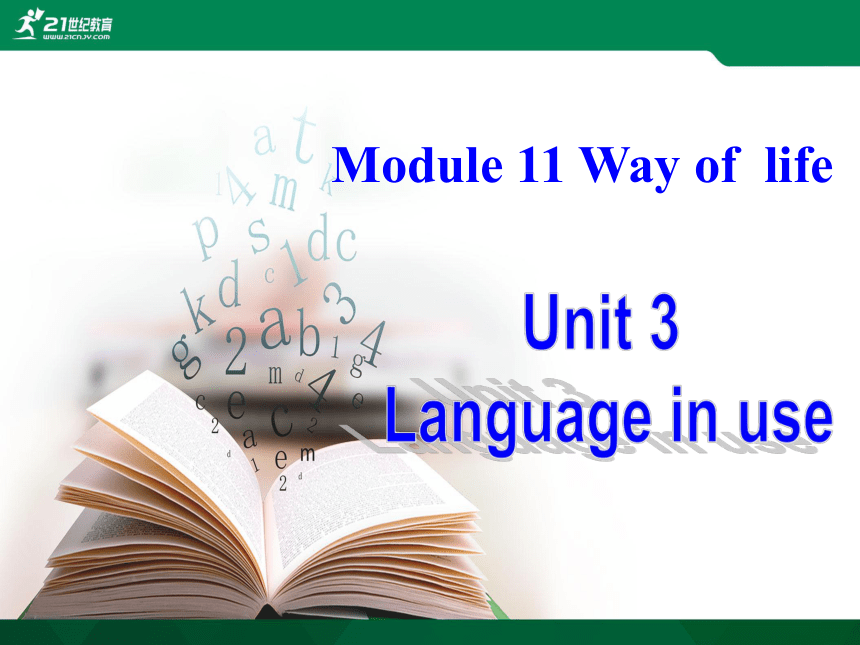 | |
| 格式 | zip | ||
| 文件大小 | 2.6MB | ||
| 资源类型 | 试卷 | ||
| 版本资源 | 外研版 | ||
| 科目 | 英语 | ||
| 更新时间 | 2019-10-18 11:35:38 | ||
图片预览


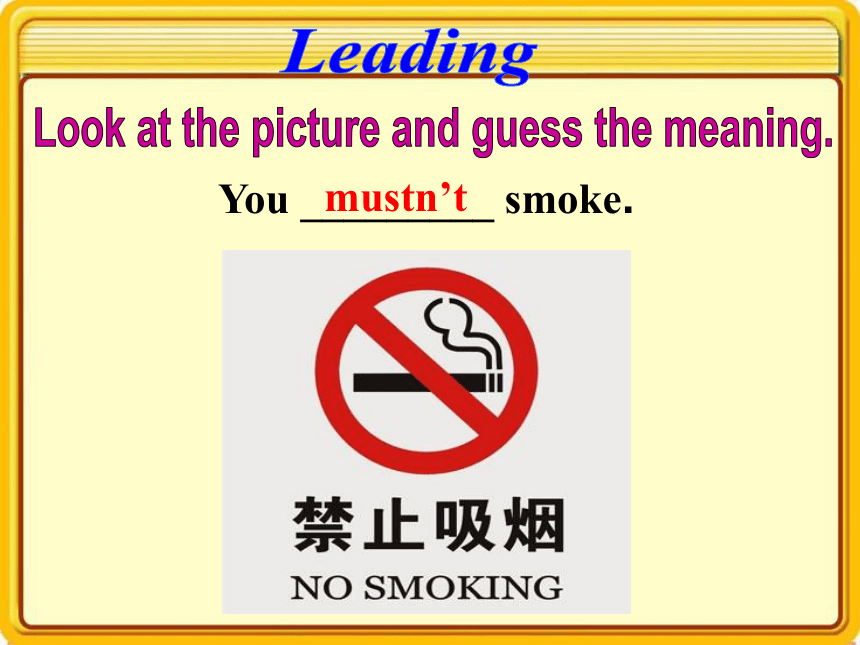
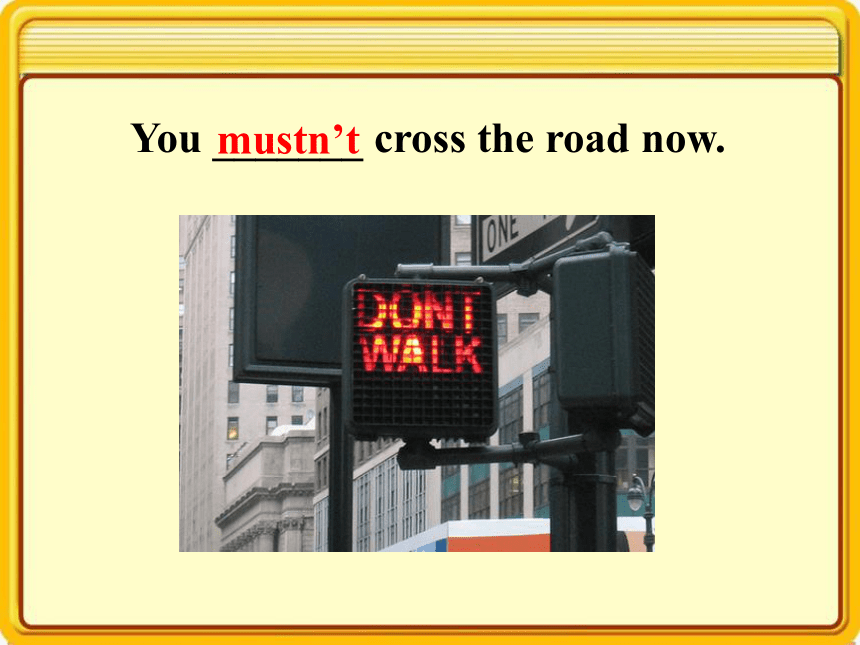
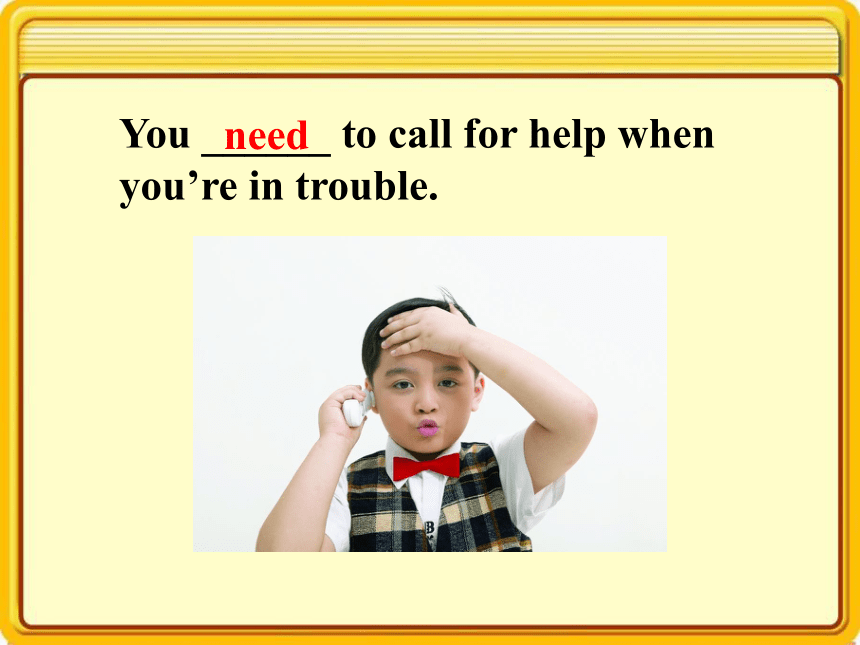
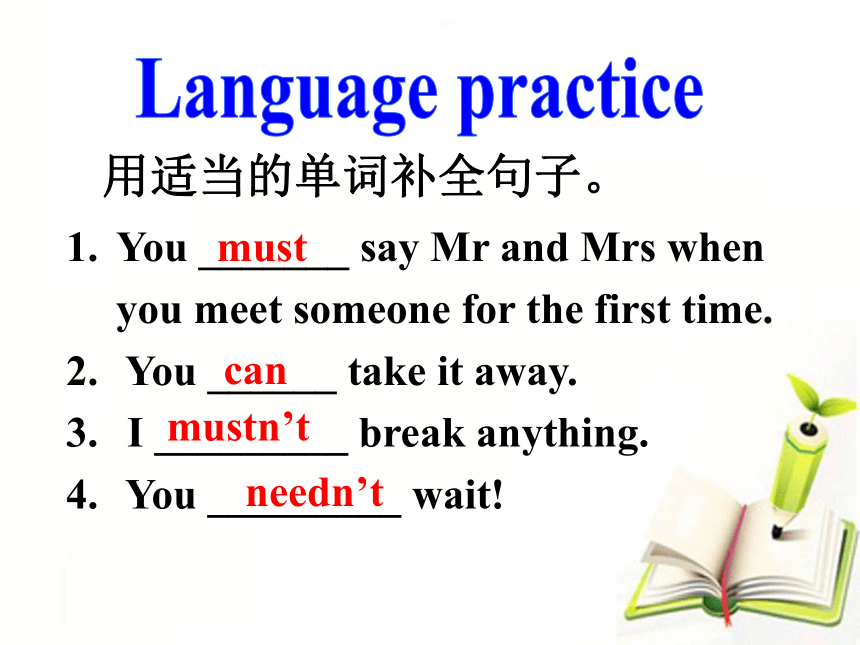
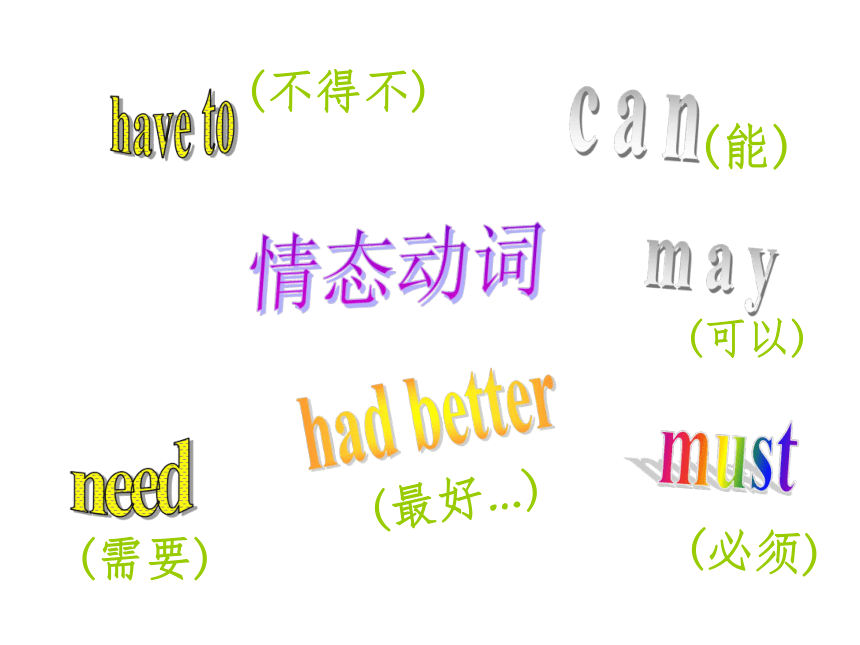
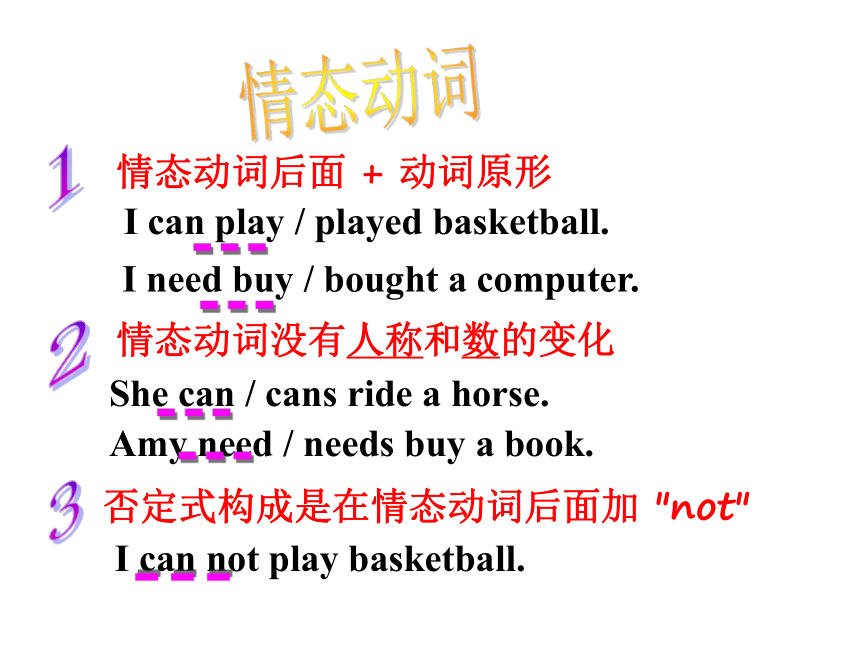
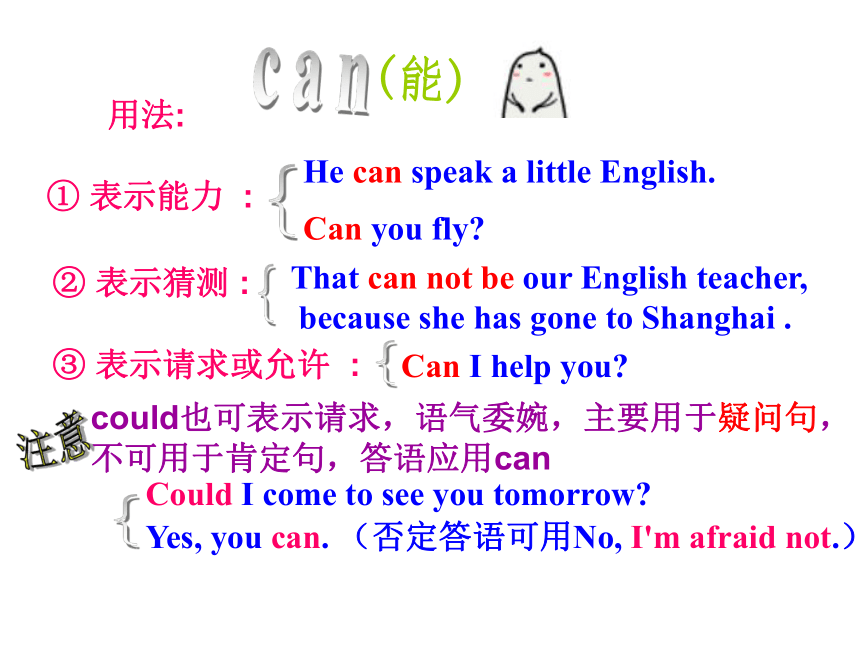

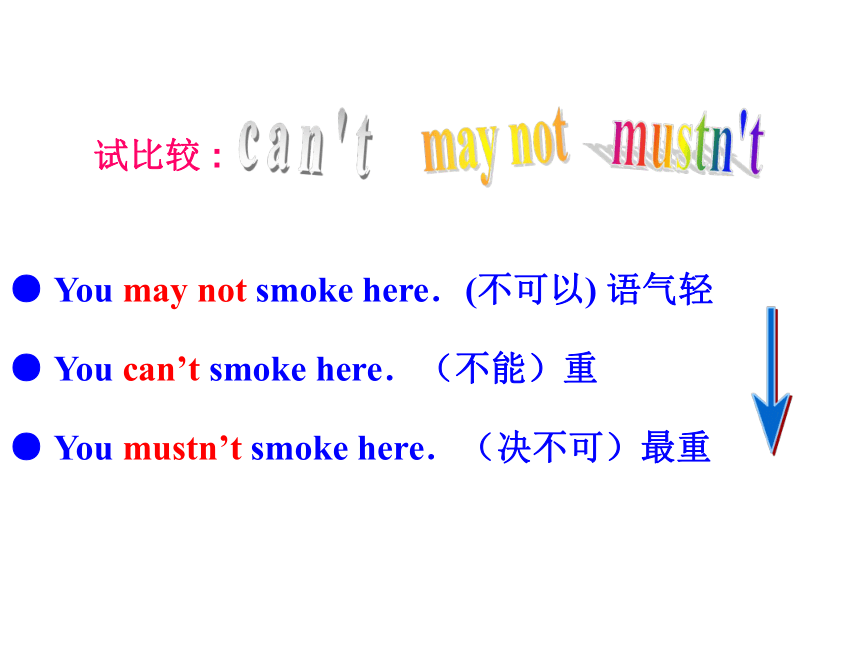
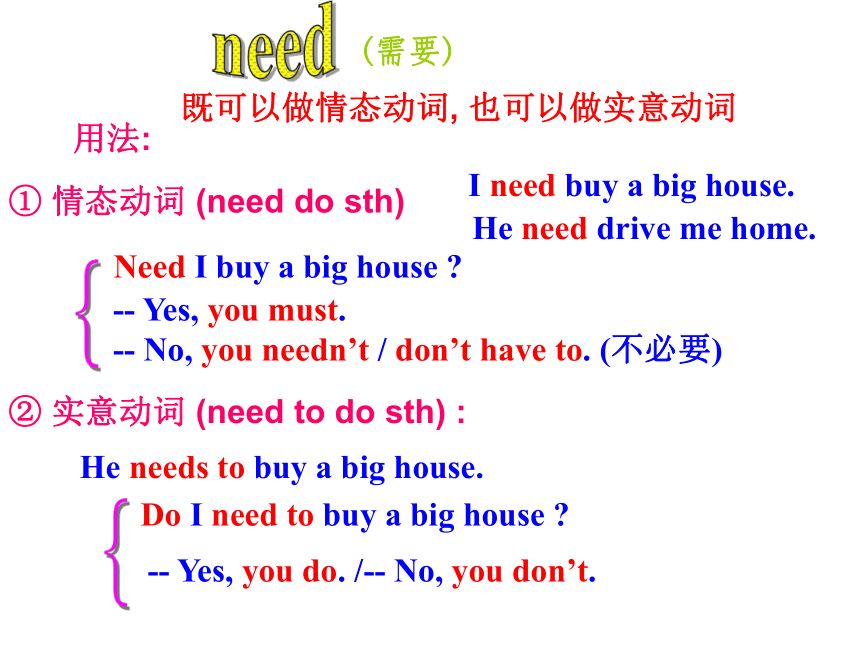
文档简介
课件45张PPT。Module 11 Way of lifeUnit 3
Language in useGrammar Focus 情态动词
must, can need等Look at the picture and guess the meaning.You _________ smoke.mustn’tLeadingYou _______ cross the road now.mustn’tYou ______ to call for help when you’re in trouble.needYou _______ say Mr and Mrs when you meet someone for the first time.
You ______ take it away.
I _________ break anything.
You _________ wait!Language practicemustn’tcanmustneedn’t用适当的单词补全句子。情态动词mayhad bettermustneed(能)(最好…)(需要)(必须)have to(不得不)can(可以)情态动词情态动词后面 + 动词原形情态动词没有人称和数的变化1I can not play basketball. I need buy / bought a computer. 2She can / cans ride a horse. Amy need / needs buy a book.------------3否定式构成是在情态动词后面加 "not" I can play / played basketball. ---can(能)用法:① 表示能力 :He can speak a little English. Can you fly? ③ 表示请求或允许 : Can I help you? ② 表示猜测 :That can not be our English teacher,
because she has gone to Shanghai . could也可表示请求,语气委婉,主要用于疑问句,
不可用于肯定句,答语应用canCould I come to see you tomorrow? Yes, you can. (否定答语可用No, I'm afraid not.) {{{注意{用法:①表示请求或允许 :May I go home,please? (1)以may(表许可或请求)开头的一般疑问句,肯定回答用may,否定回答用mustn't或can't. (2)在疑问句中不用于第二人称 ② 表示可能性 :You may be right. No, you _________ {{may(可以)Yes, you may.注意might为may的过去式,但也可以代替may,
语气较为婉转客气或更加不肯定。 You might be right. mightmustn’t / you can’t.试比较 :● You may not smoke here.(不可以) 语气轻 ● You can’t smoke here.(不能)重 ● You mustn’t smoke here.(决不可)最重 can'tmay notmustn't↓用法:既可以做情态动词, 也可以做实意动词② 实意动词 (need to do sth) :① 情态动词 (need do sth) I need buy a big house. need(需要)He need drive me home. Do I need to buy a big house ? He needs to buy a big house. Need I buy a big house ? -- Yes, you must.
-- No, you needn’t / don’t have to. (不必要)-- Yes, you do. /-- No, you don’t. {{用法:② 表示推测“肯定,一定” :① 表示义务、必要或命令 : You must come early tomorrow. ---Must I finish my homework first? They must be at home. The light is on. --- Yes, you must.
--- No, you don't have to/ needn't. {must(必须)注意must开头的疑问句,其否定回答通常用 don‘t have to
或needn’t 。而不用mustn't mustn't(禁止)③ 否定时表示 “禁止” :You mustn’t smoke here. 用法:It’s eleven o’clock . I have to go now .
It was getting dark. He had to finish the work first . I don’t have to go now .
He doesn’t have to finish the work first.have to(必须)注意have to 表示客观因素
We are very glad at the party , but it’s 11 , so we have to leave now .
must 表示主观因素
We must study hard to find a good job for ourselves .must(必须)My brother was very ill, so I call the
doctor in the middle of the night.
He said that they work hard. You don't have to tell him about it. You mustn't tell him about it. 你不一定要把此事告诉他。 你一定不要把这件事告诉他 .have tomusthad tomust
区别}had better意为“最好”,表示建议和劝告,
简略式为‘d better,否定式为had better not,
后面跟动词原形。
You had better go to see a doctor.
You’d better not stay here.
had better(最好)1. A: Can you drive a car at the age of seventeen in England?
B: Yes, we ______. How about in China?
A: No, we ________.canComplete the conversations with can or can't.can’t2. A: Can you open a gift immediately after you receive it in England?
B: ___________. What about in China?
A: No, we usually don’t.Yes, we can3. A: Can you push your way onto a bus in
England?
B: ____________. How about in China?
A: No, we ______ either.
4. A: Can you drive on the right-hand side of the road in England?
B: ___________. What about in China?
A: Yes, we must.No, we can’tcan’tNo, we can’tComplete the sentences with must or must not.1. You _______ be late for school.
2. You _______ eat in the library.
3. You _______ ride your bike in the
playground.
4. You _______ do your homework.
5. You _______ listen to the teacher.mustmustmustn’tmustn’tmustn’tSchool rulesUnderline the correct words. It’s important to know what you must and must not do when you meet people from a different country.
You (1) may/ must not ask Westerners “How old are you?” because it’s not polite. You (2)might/ can know someone well, but you (3) must/ need not ask “How much money do you make?” He (4) may/ can never speak to you again! In public places, you (5) must/ can ask people before you take photos of them, and you (6) must not/ might not eat or drink in shops or museums.
In some countries you (7) cannot/ can go into someone’s house with your shoes on. You (8) need not/ must not take them off. But in some countries you (9) might/ must not wear shoes in the house.Listen to a teenager talking about his life. Check (√) the things he must or mustn't do.√√√√√√Listen again. What two things
does he say he can do? ____________________________________
____________________________________.
2. ____________________________________
____________________________________.He can go out with his friends at weekends.He can play music loudly before ten o’clock at night.I can … I must … I must not …Write some things you can, must and must not do at home.I can watch TV when I come home from school.
I must help around the house, for example, do the washing up.
I must not go to bed late.— I must visit my grandparents once a
week. I mustn’t stay up late in the
evening.
— …Now work in pairs. Tell each other three things you
must do at home and three things you mustn't do.
Are your home rules different or the same?baseball cap chess set chopsticks dictionary presents1. Use your __________ to look up any words you do not understand.
2. Most Chinese people eat noodles with __________. dictionarychopsticks Complete the sentences with the words or expressions in the box.3. Jenny could not wait to open her birthday __________.
4. He thinks it’s cool to wear his ____________ back-to-front.
5. Where’s my __________? Let’s play a game.presents baseball cap chess set A: Many people have one.
B: Is it a chess set?
A: No. You use it to get to places.
C: Is it a bike?
A: Yes.Play a game. Choose a word or an expression from the box and
describe it to the class. The class guesses what it is.baseball cap bike chess set chocolate chopsticks dictionary fish and chips litter photo video gameTraditional presents
In the West, people often take flowers when they visit someone. Different flowers have different meanings. For example, people often give red roses to someone they love. In Greece, you must not give white flowers because that means that someone is dead.Around the world When you go to a foreign country, it is always best to check what people usually do, so you do not make a mistakes.Module task:Giving advice to foreign guests who are visiting a Chinese familyWhat must they wear?
What mustn’t they talk about?
What can’t they do?
What presents can they bring?
When must you arrive?
…Write some advice for foreign visitors to a Chinese family. Think about:Work in groups.Show the advice you wrote in Activity 9 to your group members. Choose two best pieces of advice.Show the advice your group chose in Activity 10 to the whole class. Put the pieces of advice together to form the advice of the whole class.Send the advice of the whole class to your
foreign friends or post it on your class blog.Exercises1. — Fifty dollars for such a T-shirt!
You ____ be joking!
— I’m serious. It’s made of silk.
A. must B. need
C. may D. canA2. — Have you decided where to go for
your summer vacation?
— Not yet. We ____ go to Qingdao. It
is a good place for vacation.
A. may B. should
C. need D. must A3. — _________ I borrow your history
book?
— Sure. Here you are.
A. Must B. May
C. Need D. WillB中考链接1. You _______be tired after working for eight hours without a rest. (2013广东省)
A. can B. may C. must D. need
2. You ________do it if you really don't want to. (2013昆明市)
A. needn’t B. mustn’t
C. can’t D. couldn’tCA3. — Could I borrow your dictionary?
— Of course you ______. (2013陕西省)
A. can B. must
C. should D. willAHomework:
1. 读M12U1单词三次,签字
2. 校本作业本M11U3
3. 特训M11U3 T1,2,3,4,7谢谢21世纪教育网(www.21cnjy.com) 中小学教育资源网站 有大把高质量资料?一线教师?一线教研员?
欢迎加入21世纪教育网教师合作团队!!月薪过万不是梦!!
详情请看:
https://www.21cnjy.com/help/help_extract.php
Language in useGrammar Focus 情态动词
must, can need等Look at the picture and guess the meaning.You _________ smoke.mustn’tLeadingYou _______ cross the road now.mustn’tYou ______ to call for help when you’re in trouble.needYou _______ say Mr and Mrs when you meet someone for the first time.
You ______ take it away.
I _________ break anything.
You _________ wait!Language practicemustn’tcanmustneedn’t用适当的单词补全句子。情态动词mayhad bettermustneed(能)(最好…)(需要)(必须)have to(不得不)can(可以)情态动词情态动词后面 + 动词原形情态动词没有人称和数的变化1I can not play basketball. I need buy / bought a computer. 2She can / cans ride a horse. Amy need / needs buy a book.------------3否定式构成是在情态动词后面加 "not" I can play / played basketball. ---can(能)用法:① 表示能力 :He can speak a little English. Can you fly? ③ 表示请求或允许 : Can I help you? ② 表示猜测 :That can not be our English teacher,
because she has gone to Shanghai . could也可表示请求,语气委婉,主要用于疑问句,
不可用于肯定句,答语应用canCould I come to see you tomorrow? Yes, you can. (否定答语可用No, I'm afraid not.) {{{注意{用法:①表示请求或允许 :May I go home,please? (1)以may(表许可或请求)开头的一般疑问句,肯定回答用may,否定回答用mustn't或can't. (2)在疑问句中不用于第二人称 ② 表示可能性 :You may be right. No, you _________ {{may(可以)Yes, you may.注意might为may的过去式,但也可以代替may,
语气较为婉转客气或更加不肯定。 You might be right. mightmustn’t / you can’t.试比较 :● You may not smoke here.(不可以) 语气轻 ● You can’t smoke here.(不能)重 ● You mustn’t smoke here.(决不可)最重 can'tmay notmustn't↓用法:既可以做情态动词, 也可以做实意动词② 实意动词 (need to do sth) :① 情态动词 (need do sth) I need buy a big house. need(需要)He need drive me home. Do I need to buy a big house ? He needs to buy a big house. Need I buy a big house ? -- Yes, you must.
-- No, you needn’t / don’t have to. (不必要)-- Yes, you do. /-- No, you don’t. {{用法:② 表示推测“肯定,一定” :① 表示义务、必要或命令 : You must come early tomorrow. ---Must I finish my homework first? They must be at home. The light is on. --- Yes, you must.
--- No, you don't have to/ needn't. {must(必须)注意must开头的疑问句,其否定回答通常用 don‘t have to
或needn’t 。而不用mustn't mustn't(禁止)③ 否定时表示 “禁止” :You mustn’t smoke here. 用法:It’s eleven o’clock . I have to go now .
It was getting dark. He had to finish the work first . I don’t have to go now .
He doesn’t have to finish the work first.have to(必须)注意have to 表示客观因素
We are very glad at the party , but it’s 11 , so we have to leave now .
must 表示主观因素
We must study hard to find a good job for ourselves .must(必须)My brother was very ill, so I call the
doctor in the middle of the night.
He said that they work hard. You don't have to tell him about it. You mustn't tell him about it. 你不一定要把此事告诉他。 你一定不要把这件事告诉他 .have tomusthad tomust
区别}had better意为“最好”,表示建议和劝告,
简略式为‘d better,否定式为had better not,
后面跟动词原形。
You had better go to see a doctor.
You’d better not stay here.
had better(最好)1. A: Can you drive a car at the age of seventeen in England?
B: Yes, we ______. How about in China?
A: No, we ________.canComplete the conversations with can or can't.can’t2. A: Can you open a gift immediately after you receive it in England?
B: ___________. What about in China?
A: No, we usually don’t.Yes, we can3. A: Can you push your way onto a bus in
England?
B: ____________. How about in China?
A: No, we ______ either.
4. A: Can you drive on the right-hand side of the road in England?
B: ___________. What about in China?
A: Yes, we must.No, we can’tcan’tNo, we can’tComplete the sentences with must or must not.1. You _______ be late for school.
2. You _______ eat in the library.
3. You _______ ride your bike in the
playground.
4. You _______ do your homework.
5. You _______ listen to the teacher.mustmustmustn’tmustn’tmustn’tSchool rulesUnderline the correct words. It’s important to know what you must and must not do when you meet people from a different country.
You (1) may/ must not ask Westerners “How old are you?” because it’s not polite. You (2)might/ can know someone well, but you (3) must/ need not ask “How much money do you make?” He (4) may/ can never speak to you again! In public places, you (5) must/ can ask people before you take photos of them, and you (6) must not/ might not eat or drink in shops or museums.
In some countries you (7) cannot/ can go into someone’s house with your shoes on. You (8) need not/ must not take them off. But in some countries you (9) might/ must not wear shoes in the house.Listen to a teenager talking about his life. Check (√) the things he must or mustn't do.√√√√√√Listen again. What two things
does he say he can do? ____________________________________
____________________________________.
2. ____________________________________
____________________________________.He can go out with his friends at weekends.He can play music loudly before ten o’clock at night.I can … I must … I must not …Write some things you can, must and must not do at home.I can watch TV when I come home from school.
I must help around the house, for example, do the washing up.
I must not go to bed late.— I must visit my grandparents once a
week. I mustn’t stay up late in the
evening.
— …Now work in pairs. Tell each other three things you
must do at home and three things you mustn't do.
Are your home rules different or the same?baseball cap chess set chopsticks dictionary presents1. Use your __________ to look up any words you do not understand.
2. Most Chinese people eat noodles with __________. dictionarychopsticks Complete the sentences with the words or expressions in the box.3. Jenny could not wait to open her birthday __________.
4. He thinks it’s cool to wear his ____________ back-to-front.
5. Where’s my __________? Let’s play a game.presents baseball cap chess set A: Many people have one.
B: Is it a chess set?
A: No. You use it to get to places.
C: Is it a bike?
A: Yes.Play a game. Choose a word or an expression from the box and
describe it to the class. The class guesses what it is.baseball cap bike chess set chocolate chopsticks dictionary fish and chips litter photo video gameTraditional presents
In the West, people often take flowers when they visit someone. Different flowers have different meanings. For example, people often give red roses to someone they love. In Greece, you must not give white flowers because that means that someone is dead.Around the world When you go to a foreign country, it is always best to check what people usually do, so you do not make a mistakes.Module task:Giving advice to foreign guests who are visiting a Chinese familyWhat must they wear?
What mustn’t they talk about?
What can’t they do?
What presents can they bring?
When must you arrive?
…Write some advice for foreign visitors to a Chinese family. Think about:Work in groups.Show the advice you wrote in Activity 9 to your group members. Choose two best pieces of advice.Show the advice your group chose in Activity 10 to the whole class. Put the pieces of advice together to form the advice of the whole class.Send the advice of the whole class to your
foreign friends or post it on your class blog.Exercises1. — Fifty dollars for such a T-shirt!
You ____ be joking!
— I’m serious. It’s made of silk.
A. must B. need
C. may D. canA2. — Have you decided where to go for
your summer vacation?
— Not yet. We ____ go to Qingdao. It
is a good place for vacation.
A. may B. should
C. need D. must A3. — _________ I borrow your history
book?
— Sure. Here you are.
A. Must B. May
C. Need D. WillB中考链接1. You _______be tired after working for eight hours without a rest. (2013广东省)
A. can B. may C. must D. need
2. You ________do it if you really don't want to. (2013昆明市)
A. needn’t B. mustn’t
C. can’t D. couldn’tCA3. — Could I borrow your dictionary?
— Of course you ______. (2013陕西省)
A. can B. must
C. should D. willAHomework:
1. 读M12U1单词三次,签字
2. 校本作业本M11U3
3. 特训M11U3 T1,2,3,4,7谢谢21世纪教育网(www.21cnjy.com) 中小学教育资源网站 有大把高质量资料?一线教师?一线教研员?
欢迎加入21世纪教育网教师合作团队!!月薪过万不是梦!!
详情请看:
https://www.21cnjy.com/help/help_extract.php
同课章节目录
- Module 1 How to learn English
- Unit 1 Let's try to speak English as much as possi
- Unit 2 You should smile at her.
- Unit 3 Language in use .
- Module 2 My home town and my country
- Unit 1 It's taller than many other buildings.
- Unit 2 Cambridge is a beautiful city in the east o
- Unit 3 Language in use .
- Module 3 Sports.
- Unit 1 Nothing is more exciting than playing tenni
- Unit 2 This year we training more carefully.
- Unit 3 Language in use .
- Module 4 Planes, ships and trains .
- Unit 1 He lives the farthest from school.
- Unit 2 What is the best way to travel.
- Unit 3 Language in use .
- Module 5 Lao She Teahouse.
- Unit 1 I wanted to see the Beijing Opera.
- Unit 2 It descibes the changes in Chinese society.
- Unit 3 Language in use .
- Module 6 Animals in danger.
- Unit 1 It allows people to get closer to them .
- Unit 2 The WWF is working hard to save them all.
- Unit 3 Language in use .
- Revision module A
- Module 7 A famous story
- Unit 1 Alice was sitting with her sister by the ri
- Unit 2 She was thinking about her cat.
- Unit 3 Language in use .
- Module 8 Accidents
- Unit 1 While the car were changing to red, a car s
- Unit 2 I was trying to pick it up when it bite me
- Unit 3 Language in use .
- Module 9 Population
- Unit 1 The population of China is about 1.37 billi
- Unit 2 Arnwick was a city with 200,000 people.
- Unit 3 Language in use .
- Module 10 The weathe
- Unit 1 It might snow.
- Unit 2 The weather is fine all year round.
- Unit 3 Language in use .
- Module 11 Way of life
- Unit 1 In China ,we open a gift later.
- Unit 2 In England, you usually drink tea with milk
- Unit 3 Language in use .
- Module 12 Help
- Unit 1 What should we do before help arrives?
- Unit 2 Stay away from windows and heavy furniture.
- Unit 3 Language in use .
- Revision module B
